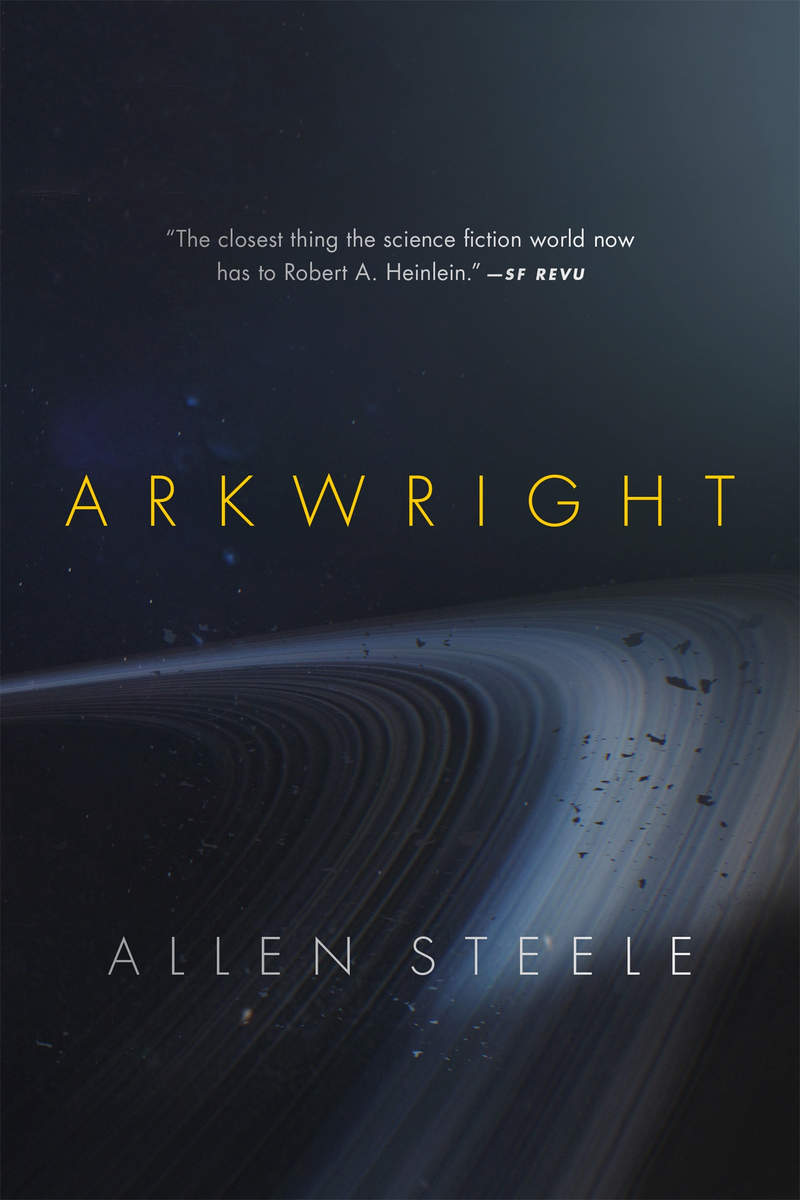
Allen M. Steele has been known for his hard science fiction novels: Coyote, Orbital Decay, and others. In his latest, Arkwright, he’s assembled an epic generational novel that meditates on the value of science fiction, and where it can lead us in the universe.
Steele opens his novel with a dying science fiction author. Nathan Arkwright was one of the ‘big four’ science fiction authors, up there alongside Robert Heinlein, Arthur C. Clarke and Isaac Asimov. His Galactic Patrol stories featuring Hak Tallus landed him on bestseller lists, and upon his passing, it’s front page news. However, Arkwright isn’t content to just die: he wants to use his stories, wealth and legacy to change the world, and sets up a project that will change humanity.
Originally published in Asimov’s Science Fiction as a series of novelettes and novellas (The Legions of Tomorrow, The Prodigal Son, The Long Wait and The Children of Gal), Steele has assembled a book much in the form of the tradition he emulates. Collectively, they tell an epic family story that spans generations, from the early 1930s to the far future. Along the way, he shows us that science fiction can be the seed of something much greater.
http://www.amazon.com/Arkwright-Alle...
Arkwright, moved by the launch of Apollo 17 and his own mortality, devises a plan to use his considerable assets to create the Arkwright Foundation, an organization dedicated to bringing humanity far out into the universe, must like his science fictional heroes have done. It’s at points cynical: NASA has been relegated to offices in Washington DC, a shadow of the agency it once was, while climate change has changed the face of the plant.

At the same time, it’s deeply optimistic, and wonderfully meta. The first part, The Legions of Tomorrow, is a brilliant waltz through science fiction’s history, beginning with the first World Science Fiction convention in July 1939. Familiar faces show up: Ray Bradbury, Sam Moskowitz, Frederik Pohl, David Kyle, Isaac Asimov and others, and we follow Arkwright’s career and family difficulties over the coming decades. The part is worth the price of admission alone, and while it sticks closely to the traditional view of science fiction history, Steele has done an artful job at inserting a fictional author into the mix.
The next section, The Prodigal Son, starts to get into the big ideas. The Arkwright Foundation uses the resources at its disposal to fund research for a big project: a ship that will traverse outer space to a star, where it’ll seed a new instance of humanity. Arkwright’s descendants have taken up his vision, assembling and launching the project, a beam-powered interstellar starship bound for Gliese 667C-e
They navigate practical and personal issues as they mission unfolds, and as the book continues, the mission becomes a distant memory, but a force that drives the family, for better or worse.
Steele has played with these sorts of grand stories before: his novel Coyote plays with some very similar ideas, but in a more realistic and nuanced fashion: it’s not until the end that we see the end result of Arkwright’s plans. In many ways, I was reminded of one of my favorite novels, Isaac Asimov’s Bicentennial Man.
Steele is an ideal author for this sort of book: in the acknowledgements, he notes how the 100 Year Starship Symposium had helped with the genesis of the story, and he’s testified before the U.S. House of Representatives Subcommittee on Space and Aeronautics about space exploration. The technical details shine through in grand fashion here: this is a science fiction novel that is pretty much the definition of hard SF. It’s also a timely novel, with recent news about photonic propulsion, privatized space travel
The book isn’t perfect: because of the nature of its serialized nature, it lives and dies on the merits of the individual sections, but for the most part, it comes through well. Steele never takes his eyes off the big picture, and as a result, we never quite get enough time with the characters: we see multiple generations of the Arkwrights as they grow old and die. This might be by design: we are, after all, a blip in the cosmos, but with a bit more work on the characters, this would have been a much stronger novel.
What impressed me the most here, however, is the reminder of the unique position that science fiction occupies in the arts world. It’s a unique genre in that it is constantly imagining and reimagining what the future might hold. It’s a topic that’s frequently debated at conventions and in essays, but I think that Steele has made an interesting point here: science fiction can’t really predict the future, but it can position itself to preempt it: it can inspire a direction that we can take. Steele’s Nathan Arkwright does exactly that: he spends his career imagining vast galactic adventures, and by the end, that’s exactly the result: a vast galactic adventure on a distant world.
Arkwright is a great read, and one that wears its love for genre fiction proudly. Steele has taken the brightest and most recognizable parts of science fiction - that sense of wonder, the ability to tell grand stories on cosmic levels, and sense of can-do exploration - and woven it into a novel that’s profoundly aware of where it comes from. It’s certainly a science fiction novel that follows in the path of authors like Heinlein and Clarke, and recent books such as Aurora and Seveneves
Follow the author on Twitter at @andrewliptak